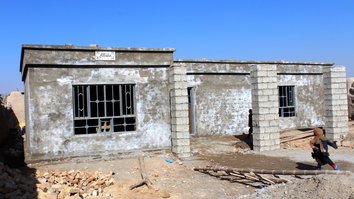KUNDUZ -- The US Agency for International Development (USAID) is building housing for families displaced by natural disasters near Qazi Qeshlaq village of Darayim district, Badakhshan province, local authorities say.
The residential town of more than 45 jeribs (22.2 acres) of land will accommodate 215 families, Ahmad Seyar, the provincial director of the non-profit Agency for Technical Co-operation and Development (ACTED), said November 15.
Some 103 houses are complete and available, and construction work is ongoing to complete the second phase of the project, he said.
Each house, which includes two bedrooms, a hallway/living room and a bathroom in an area of 400 square metres, costs about $2,600 (243,000 AFN), Seyar said, adding that the whole project will cost $268,000 (25 million AFN), funded by USAID.
"We officially inaugurated the township on November 11 by handing over the keys of each house to its owners," he said.
The project responds to the dire needs of returnees and those affected by conflict and natural disasters, said Seyar.
Landslides in Argo, Daraiym and Ragh districts near the border with Tajikistan in November 2017 destroyed some 40 villages, displacing about 250 families from those areas to the village of Qazi Qeshlaq, said Abdullah Khalili, a tribal elder from Darayim district.
The US government had agreed to provide temporary shelter for displaced families at the request of the previous Afghan government, he said.
"Providing shelter to the disaster-affected families is a very crucial step in addressing the current humanitarian crisis, which is threatening many locals with severe winter on one hand and poverty and hunger on the other," he said.
Allawddin Rahimi, a resident of Qazi Qeshlaq and the new owner of one house, hopes to have a better future alongside his children.
"We were living in a dire situation... for four years, facing hot summers and cold winters" with no house to shelter in," he said.
"I am grateful that now I have a proper shelter to keep me and my children warm."
With the inauguration of this township, the weather-associated problems of many displaced families will be resolved, said Mohammad Hussein Qaim, a resident of Faizabad, the capital of Badakhshan.
However, it is equally important to provide food and other essential supplies for these vulnerable families, he added.
Natural disasters, famine
The province is prone to natural disasters, Rohullah Nadery, an environmental adviser in Badakhshan, told Salaam Times.
"Humanitarian organisations continue to provide everything for our people," including building houses and shelters, "but they neglect to take good care of these facilities," he said.
"We urge locals in this town to look after the maintenance of these valuable assets so that they can be of use for a long time."
Nearby forests in Darayim, Argo, Khash and Khawan Waragha districts were destroyed in conflict, raising the risk of soil erosion and leaving villages at higher risk of natural disasters, according to Mohammad Yasin Hurmat, a mining analyst in Badakhshan.
More than 350 people were killed and hundreds more were rescued after the Badakhshan landslides of 2017, he said, citing the same ones that Khalili the tribal elder recalled.
To make matters worse, increasing poverty and hunger in Afghanistan have led to continuing fears of a humanitarian catastrophe.
"To abandon the Afghan people now would be a historic mistake -- a mistake that has been made before with tragic consequences," Deborah Lyons, the secretary-general's special representative and head of the United Nations Assistance Mission in Afghanistan (UNAMA), said last Wednesday (November 17).
With the winter approaching, up to 23 million Afghans will be in crisis or emergency levels of food insecurity, she said.
Moreover, although the risk of famine was once restricted to rural areas, 10 out of 11 of Afghanistan's most densely populated urban areas are now anticipated to be at emergency levels of food insecurity, she added.
On Tuesday, the UN said its flash appeal for more than $600 million to support the humanitarian response in Afghanistan until the end of the year was now fully funded.
The main donors were the United States, European countries and Japan, who helped reach the total funding goal of $606 million.
The funds are directed towards helping the 11 million most deprived people in Afghanistan.

![ACTED on November 11 inaugurated more than 100 newly built homes funded by USAID in Badakhshan province. [Muhammad Nazem Qasemi]](/cnmi_st/images/2021/11/23/32773-badakhshan-housing-usaid-585_329.jpg)






